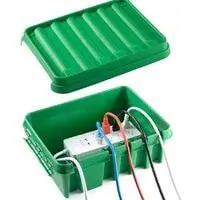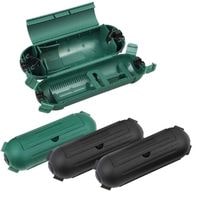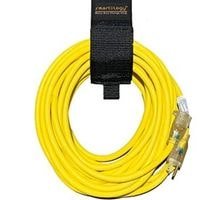How to protect outdoor extension cord from rain. Outdoor extension cords are mainly used for outdoor lighting.
It is essential to keep your outdoor extension cords dry to avoid the risks of cords getting damaged and other health hazards. These extension cords are made from plastic, rubber, or vinyl cover.
How to protect outdoor extension cord from rain
They are designed to resist moisture in the air. This insulation covering protects the cords in all temperatures and climates.
But sometimes, this insulation sheath is damaged from sunlight or from being in use for a long time.
To avoid such a scenario, you need to check your extension cords regularly, especially in extreme weather.
With this complete guide, you will be able to protect your outdoor extension cord from rain. We will discuss all the methods.
1. Using a plastic casing
Using a plastic casing to protect the extension cords is the most expensive standard method. These plastic casings are readily available at any hardware store.
These casings provide extra sheath on your extension cord.
2. Using plastic covering
Another method to protect the extension cords is by using plastic covers that you can make yourself. Just take the size of your extension cord and make a cover out of a plastic bottle for it.
It will be the least expensive but less durable. The steps of making a homemade plastic cover are:
- Take an empty plastic bottle, rinse and dry it inside.
- Cut a slit in the middle of the bottle horizontally.
- Using your scissors, cut small holes on each side of the slit. The extension cord will pass through these holes.
- Pass the wire through these holes.
Though this method is relatively very cheap and handy, it is unreliable in safety.
3. Using a pallet wrap
You can buy pallet wrap from a hardware store. This wrap is usually solid and reliable to ensure the protection of the outdoor extension cords from rain.
You will have to wrap the extension cord tightly with the pallet wrap so that it can withstand rain and moisture.
This pallet wrap can also be wrapped around your homemade plastic cover to ensure extra protection.
4. Using a Plastic bag
Another method to protect an extension cord is wrapping a plastic bag around it. Though this method is the least expensive, it is not preferable when you want a more reliable solution and doesn’t want it to look bad.
5. Using a Duct tape
This method is very commonly used for extension cord protection from rain. The duct tape is water and moisture-resistant and is readily available from hardware stores.
This solution is not for long-term use, as duct tapes get damaged with time and extreme weather.
6. Using a PVC pipe
You can protect your extension cord by using a PVC pipe and end cap. This ensures that the rainwater will not enter the wires and wire connections.
You will have to buy PVC pipes and end-caps from a hardware store and pass the cord through these pipes.
Conclusion
How to protect outdoor extension cord from rain. Though there are numerous methods to protect the outdoor extension cord from rain and extreme weather, you need to choose the method that suits you the most.
Some methods are expensive but reliable, like protecting PVC pipes or heavy-duty cord protectors.
Some methods are less expensive but are not advisable in case of protection for a more extended period, like using plastic bottles, plastic bags, or duct tape.
Whichever method you choose, you need to follow instructions and preventive measures to avoid any electrical shock injuries or accidents.
FAQ
Can outdoor extension cords be used in rain?
How to protect outdoor extension cord for snow?
Use plastic wrap. Plastic wrap is the way to go for outdoor use. Place it around your knowledge base system’s connection section, then tightly wind the wrap around so that no moisture can get in and no electricity will ever shock any of its users.
How to run extension cord from inside to outside?
Use an outdoor-rated extension cord. It will have been tested to withstand a variety of dangers, including the sun, temperature variations, moisture, and foot traffic.
Do not use indoor cords outdoors.
They are not designed for outside environments. These indoor cords are relatively cheap when compared to the expense of property damage caused by fire or shock.
Related Guides


